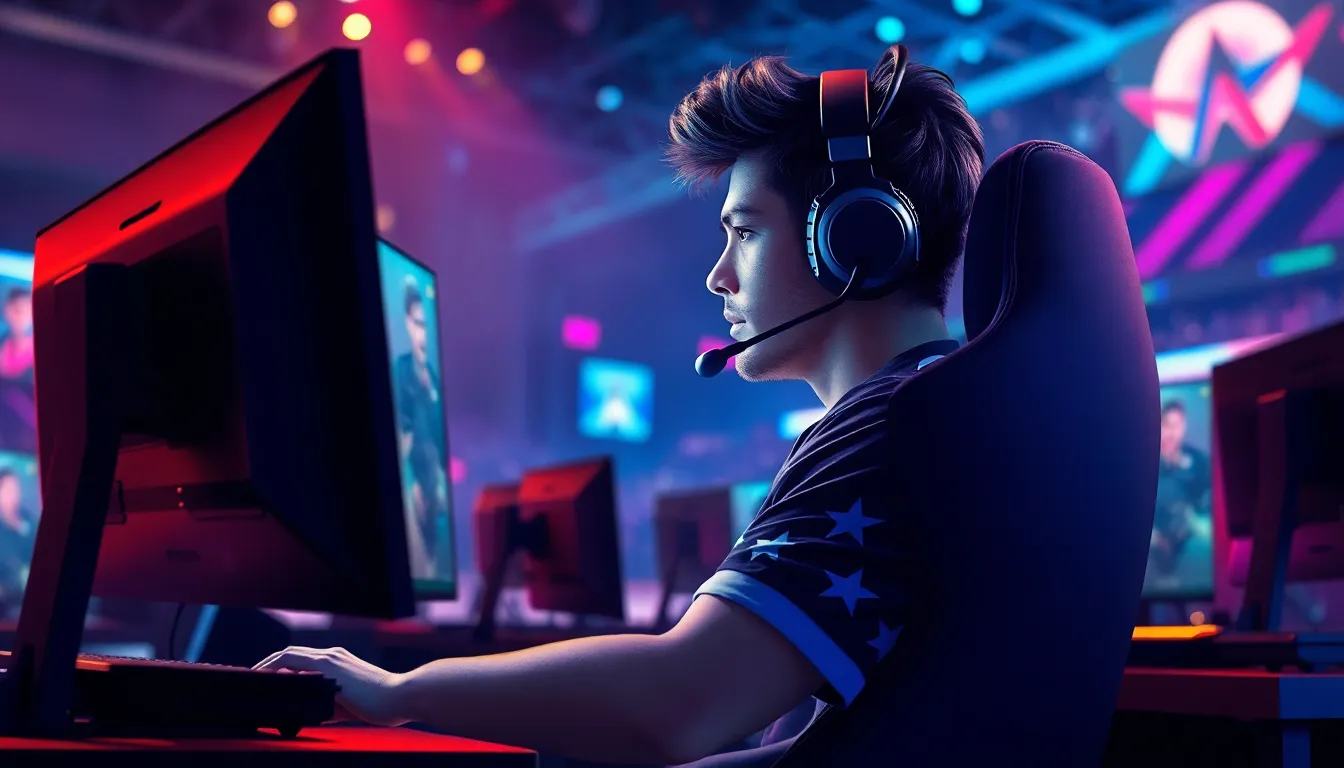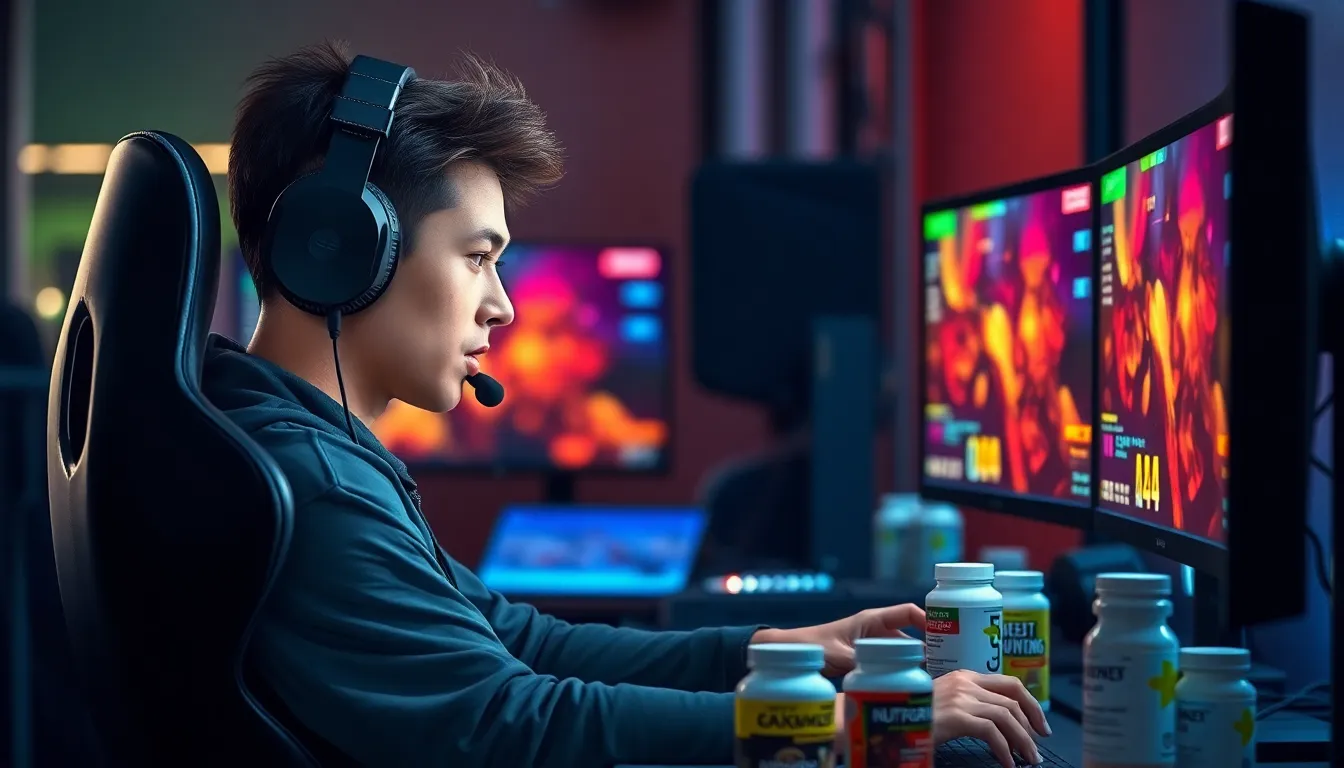In a world where gaming isn’t just a pastime but a legitimate career, esports training has become the secret sauce for aspiring champions. Gone are the days when players relied solely on their reflexes and a bag of chips. Now, it’s all about strategy, teamwork, and yes, even a bit of cardio to keep those thumbs nimble. If someone thinks they can just hop on their console and dominate without training, they might as well challenge a cat to a staring contest—it’s not gonna end well.
Esports Training
Esports training encompasses the structured preparation required for competitive gaming. This process involves various elements that contribute to a player’s performance.
What Is Esports Training?
Esports training extends beyond traditional gaming practice. It includes skill development, strategic analysis, and mental conditioning. Players engage in drills that enhance hand-eye coordination and reaction times. Trainers often use simulations to improve decision-making in high-pressure situations. Nutrition and physical fitness also play pivotal roles, ensuring players maintain peak physical condition. Tactics and teamwork are essential, as communication can significantly impact match outcomes.
Importance of Esports Training
Esports training holds vital importance in achieving success in competitive gaming. Serious contenders recognize that a lack of training can hinder their performance. Structured training allows players to develop game sense and strategic understanding. Players who train effectively often differentiate themselves through improved skills and adaptability. It cultivates professionalism, preparing individuals for the demands of competitive environments. Players gain insights into their weaknesses, enabling targeted improvement efforts. Engaging in regular training also fosters resilience, crucial in facing challenging opponents.
Key Components of Esports Training

Esports training involves several key components that support players in achieving peak performance.
Physical Fitness
Physical fitness plays a critical role in esports training. Players must maintain agility, endurance, and overall health to sustain long gaming sessions. Daily exercise routines can include cardiovascular activities and strength training to enhance stamina and reduce fatigue. Flexibility exercises, such as stretching, help prevent injuries, enabling players to stay fit and focused. Regular fitness assessments provide insights into areas for improvement, while a balanced diet fuels physical and mental performance. Nutritionists often guide players on meal plans that optimize focus and reaction times. Prioritizing physical fitness ensures players remain competitive in high-stress environments.
Mental Conditioning
Mental conditioning significantly impacts esports performance. Players engage in practices that enhance focus, concentration, and stress management. Techniques like visualization and breathing exercises help players prepare for high-pressure situations. Regular practice of mindfulness can improve emotional regulation and maintain composure during tournaments. Coaches often implement strategies that promote resilience, encouraging players to learn from setbacks. Additionally, cognitive exercises sharpen decision-making skills, allowing players to analyze gameplay quickly. This holistic approach to mental conditioning is essential for achieving success in the competitive landscape of esports.
Training Methods in Esports
Esports training incorporates various methods to develop skills necessary for competition. These methods can be divided into individual training and team training segments.
Individual Training
Individual training focuses on personal skill enhancement. Players practice specific mechanics, refine their decision-making, and improve their reaction times. Drills tailored to their game of choice help in developing muscle memory. Additionally, players analyze gameplay footage to identify weaknesses. Incorporating physical exercises designed to boost endurance and flexibility complements these skill sets. Nutrition significantly influences individual performance, with meal plans designed to support focus and cognitive function. Mental techniques like visualization prepare players for competitive scenarios, enhancing inner strength and reliability under pressure. This comprehensive approach ensures individuals not only master their gameplay but also maintain the physical and mental sharpness needed for excellence.
Team Training
Team training emphasizes collaboration and communication among players. Developing synergy within a team proves vital for success. Practicing strategies together enables groups to navigate complex game scenarios effectively. Regular team meetings to discuss tactics and objectives help clarify roles and responsibilities. Teams also conduct scrimmages against other squads, simulating real match conditions to build cohesion. Feedback sessions provide insights into performance and foster collective growth. Understanding each member’s strengths enhances team dynamics and overall performance. Incorporating mental conditioning exercises into team training allows groups to handle pressure collectively. This cohesive training strategy creates a well-rounded, adaptable team ready to face competitive challenges.
Tools and Resources for Esports Training
Esports training encompasses various tools and resources that amplify players’ skills and performance.
Coaching Software
Training software streamlines the coaching process, enabling trainers to create personalized training regimens. Programs like GYO Score and Mobalytics enhance player evaluation through metrics and benchmarks. Players access feedback and progress tracking conveniently, which promotes continuous improvement. Engaging with the software supports goal-setting and accountability between players and coaches. Trainers benefit from using these platforms as they adapt strategies based on player performance data, which hones in on weaknesses while reinforcing strengths.
Performance Analysis Tools
Performance analysis tools offer critical insights into gamer behavior and match performance. Tools such as LEAGUE of Legends Analytics and Fortnite Tracker provide detailed statistics, allowing players to dissect their gameplay. Reviewing recorded matches helps identify patterns and improve decision-making during high-stakes situations. Players uncover areas for improvement and receive actionable feedback, which boosts overall game effectiveness. Employing these tools fosters a deeper understanding of game mechanics, equipping players to adapt strategies on the fly.
Conclusion
Esports training is no longer an option but a necessity for those aiming to excel in competitive gaming. As the landscape evolves players must embrace structured preparation that combines skill development with physical and mental conditioning. This holistic approach not only enhances individual performance but also fosters teamwork and resilience.
With the right training methods and resources players can optimize their gameplay and adapt to the ever-changing dynamics of esports. By prioritizing fitness nutrition and mental strategies aspiring champions can position themselves for success in this highly competitive arena. The journey may be challenging but the rewards of dedication and hard work in esports training are undeniable.

